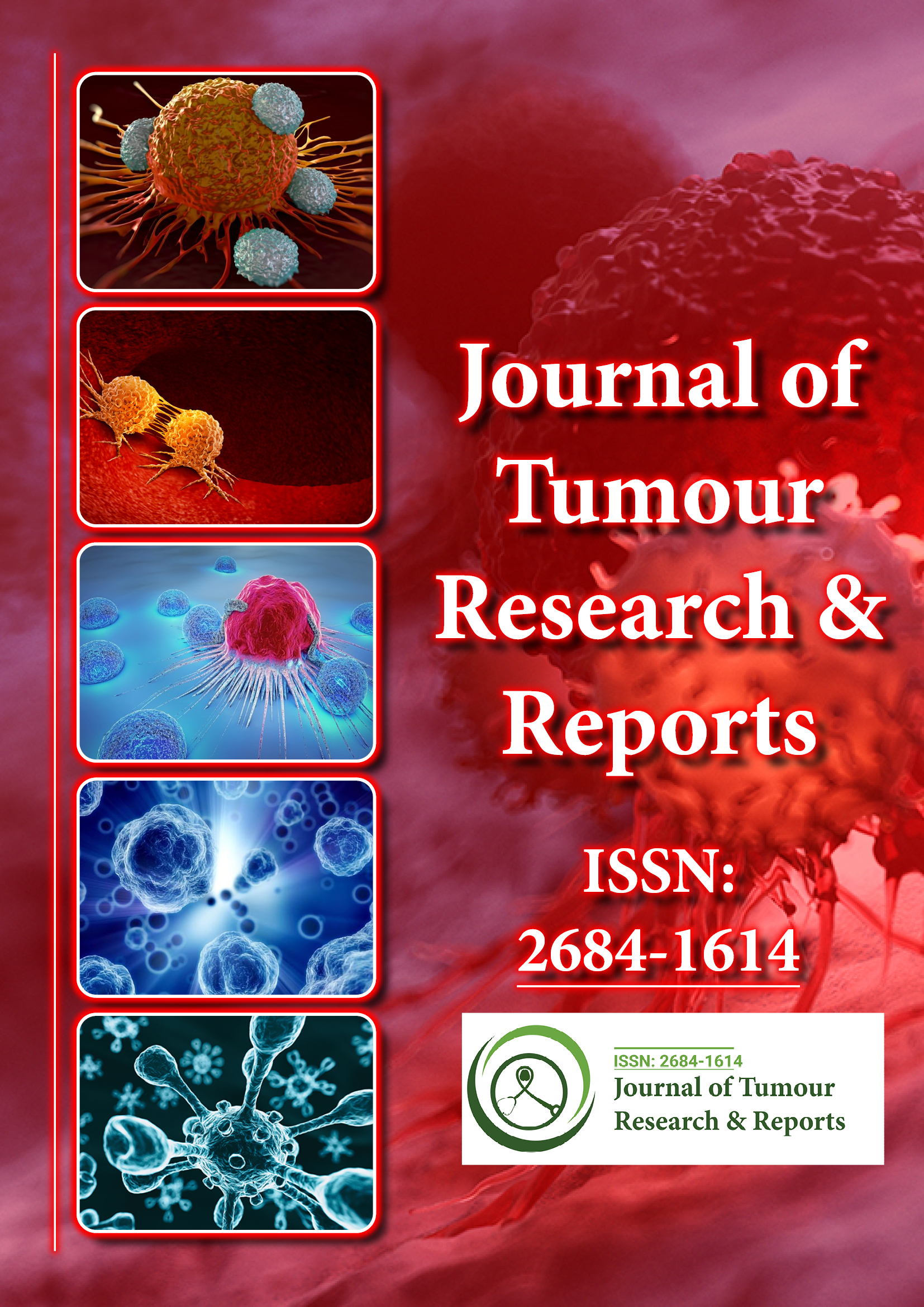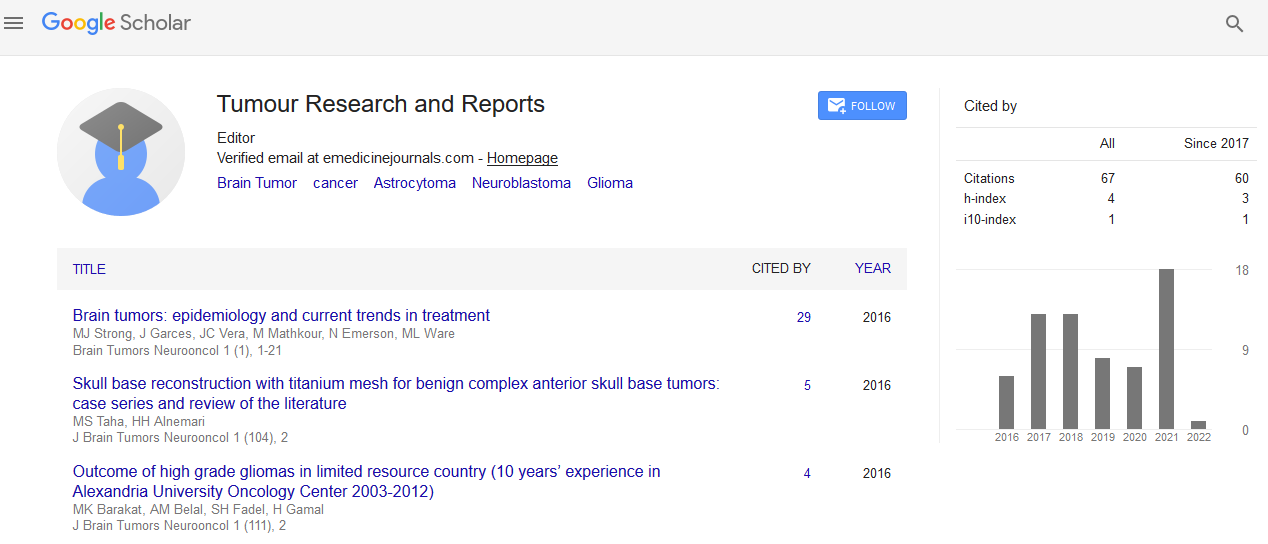Indexed In
- RefSeek
- Hamdard University
- EBSCO A-Z
- Google Scholar
Useful Links
Share This Page
Journal Flyer

Open Access Journals
- Agri and Aquaculture
- Biochemistry
- Bioinformatics & Systems Biology
- Business & Management
- Chemistry
- Clinical Sciences
- Engineering
- Food & Nutrition
- General Science
- Genetics & Molecular Biology
- Immunology & Microbiology
- Medical Sciences
- Neuroscience & Psychology
- Nursing & Health Care
- Pharmaceutical Sciences
Opinion - (2023) Volume 8, Issue 4
The Role of Tissue-Specific Promoters in the Treatment for Colorectal Cancer
Steele Thompson*Received: 14-Nov-2023, Manuscript No. JTRR-23-23201; Editor assigned: 17-Nov-2023, Pre QC No. JTRR-23-23201 (PQ); Reviewed: 01-Dec-2023, QC No. JTRR-23-23201; Revised: 08-Dec-2023, Manuscript No. JTRR-23-23201 (R); Published: 15-Dec-2023, DOI: 10.35248/2684-1614.23.8:204
Description
Colorectal Cancer (CRC) is a complex and heterogeneous disease that remains a significant global health burden. Despite advances in understanding its underlying genetic and molecular mechanisms, the development of effective treatments for CRC still faces challenges. One of the potential way for improving therapy is the use of tissue-specific promoters. These promoters play a significant role in regulating gene expression in a highly selective manner, holding the potential to target cancer cells specifically while sparing healthy tissue.
The landscape of colorectal cancer
Colorectal cancer is a multifactorial disease characterized by the accumulation of genetic and epigenetic alterations in normal colonic epithelial cells. These alterations can lead to uncontrolled cell growth and the formation of malignant tumours in the colon or rectum. CRC often develops from benign precursors, such as adenomatous polyps, and progresses through various stages, ultimately leading to invasive cancer.
The heterogeneity of CRC poses a significant challenge for the development of targeted therapies. Tumour-specific genetic alterations can vary significantly between patients, necessitating a personalized approach to treatment. Tissue-specific promoters offer a way to address this challenge by directing therapeutic agents selectively to cancer cells while sparing healthy tissue.
Tissue-specific promoters: A primer
Tissue-specific promoters are regulatory DNA sequences that control the expression of specific genes in a highly restricted manner. They are essential for maintaining the proper function of various tissues in the body by ensuring that the right genes are expressed in the right cells at the right time. In the context of cancer therapy, these promoters can be harnessed to achieve targeted gene expression within tumours.
One of the most well-known tissue-specific promoters is the Prostate-Specific Antigen (PSA) promoter, which is highly active in prostate tissue. Researchers have utilized the PSA promoter to drive the expression of therapeutic genes selectively in prostate cancer cells, demonstrating the potential of this approach in the treatment of localized prostate cancer.
Tissue-specific promoters in colorectal cancer
In colorectal cancer, tissue-specific promoters offer an exciting avenue for precision therapy. Several promoters have shown potential in selectively targeting CRC cells. These include, but are not limited to:
Carcinoembryonic Antigen (CEA) promoter: CEA is a glycoprotein that is overexpressed in many CRC cases. The CEA promoter has been used to drive the expression of therapeutic genes specifically in colorectal cancer cells, exploiting the tumour's own biology for targeted therapy.
Guanylyl cyclase C (GCC) promoter: GCC is expressed in normal colonic epithelial cells and is often retained in early-stage CRC. Utilizing the GCC promoter allows for selective targeting of CRC cells while minimizing off-target effects on healthy tissues.
Colon-specific promoters: Various colon-specific promoters have been identified, which can be leveraged to direct therapeutic agents specifically to the colon. These promoters hold a potential for the treatment of localized CRC.
Precision therapy with tissue-specific promoters
The use of tissue-specific promoters in colorectal cancer therapy offers several advantages:
Targeted therapy: Tissue-specific promoters enable the precise targeting of therapeutic agents to cancer cells, reducing collateral damage to healthy tissue. This selective approach can enhance the therapeutic index and minimize side effects.
Personalized medicine: Given the heterogeneity of CRC, tissue-specific promoters allow for personalized treatment strategies. Physicians can choose promoters that match the specific genetic and molecular profile of a patient's tumour, increasing the probability of treatment success.
Improved efficacy: By concentrating therapeutic agents within the tumour microenvironment, tissue-specific promoters can enhance the efficacy of treatment. This may lead to better tumour regression and improved patient outcomes.
Challenges and future directions
While tissue-specific promoters hold great potential in CRC therapy, several challenges must be addressed:
Promoter specificity: Achieving high specificity while avoiding off-target effects is potential. Researchers must fine-tune the activity of tissue-specific promoters to ensure that therapeutic genes are expressed only in cancer cells.
Delivery methods: Efficient delivery of therapeutic agents to the tumour site remains a hurdle. Developing effective delivery systems, such as viral vectors or nanoparticles, is essential for the clinical translation of this approach.
Resistance mechanisms: As with any targeted therapy, resistance mechanisms can emerge over time. Understanding and overcoming these mechanisms will be vital for the long-term success of tissue- specific promoter-based treatments.
Tissue-specific promoters represent a potential strategy for precision therapy in colorectal cancer. By utilizing the specificity of these promoters, researchers and clinicians can target cancer cells while sparing healthy tissue, potentially revolutionizing the treatment landscape for CRC. As our understanding of CRC continues to evolve, tissue-specific promoters offers a confidence for more effective personalized, and less toxic therapies in the fight against this devastating disease.
Citation: Thompson S (2023) The Role of Tissue-Specific Promoters in the Treatment for Colorectal Cancer. J Tum Res Reports. 8:204.
Copyright: © 2023 Thompson S. This is an open access article distributed under the terms of the Creative Commons Attribution License, which permits unrestricted use, distribution, and reproduction in any medium, provided the original author and source are credited.

